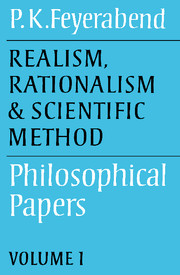Book contents
- Frontmatter
- Contents
- Introduction to volumes 1 and 2
- PART I ON THE INTERPRETATION OF SCIENTIFIC THEORIES
- 1 Introduction: scientific realism and philosophical realism
- 2 An attempt at a realistic interpretation of experience
- 3 On the interpretation of scientific theories
- 4 Explanation, reduction and empiricism
- 5 On the ‘meaning’ of scientific terms
- 6 Reply to criticism
- 7 Science without experience
- PART 2 APPLICATIONS AND CRITICISMS
- Sources
- Name index
- Subject index
4 - Explanation, reduction and empiricism
Published online by Cambridge University Press: 05 June 2012
- Frontmatter
- Contents
- Introduction to volumes 1 and 2
- PART I ON THE INTERPRETATION OF SCIENTIFIC THEORIES
- 1 Introduction: scientific realism and philosophical realism
- 2 An attempt at a realistic interpretation of experience
- 3 On the interpretation of scientific theories
- 4 Explanation, reduction and empiricism
- 5 On the ‘meaning’ of scientific terms
- 6 Reply to criticism
- 7 Science without experience
- PART 2 APPLICATIONS AND CRITICISMS
- Sources
- Name index
- Subject index
Summary
The main contention of the present paper is that a formal account of reduction and explanation is impossible for general theories, or noninstantial theories, as they have also been called. More especially, it will be asserted and shown that wherever such theories play a decisive role both Nagel's theory of reduction and the theory of explanation associated with Hempel and Oppenheim cease to be in accordance with actual scientific practice and with a reasonable empiricism. It is to be admitted that these two ‘orthodox’ accounts fairly adequately represent the relation between sentences of the ‘All-ravens-are-black’ type, which abound in the more pedestrian parts of the scientific enterprise. But if the attempt is made to extend these accounts to such comprehensive structures of thought as the Aristotelian theory of motion, the impetus theory, Newton's celestial mechanics, Maxwell's electrodynamics, the theory of relativity, and the quantum theory, then complete failure is the result. What happens here when a transition is made from a theory T′ to a wider theory T (which, we shall assume, is capable of covering all the phenomena that have been covered by T′) is something much more radical than incorporation of the unchanged theory T′ (unchanged, that is, with respect to the meanings of its main descriptive terms as well as to the meanings of the terms of its observation language) into the context of T.
Information
- Type
- Chapter
- Information
- Realism, Rationalism and Scientific MethodPhilosophical Papers, pp. 44 - 96Publisher: Cambridge University PressPrint publication year: 1981
Accessibility standard: Unknown
Why this information is here
This section outlines the accessibility features of this content - including support for screen readers, full keyboard navigation and high-contrast display options. This may not be relevant for you.Accessibility Information
- 18
- Cited by
